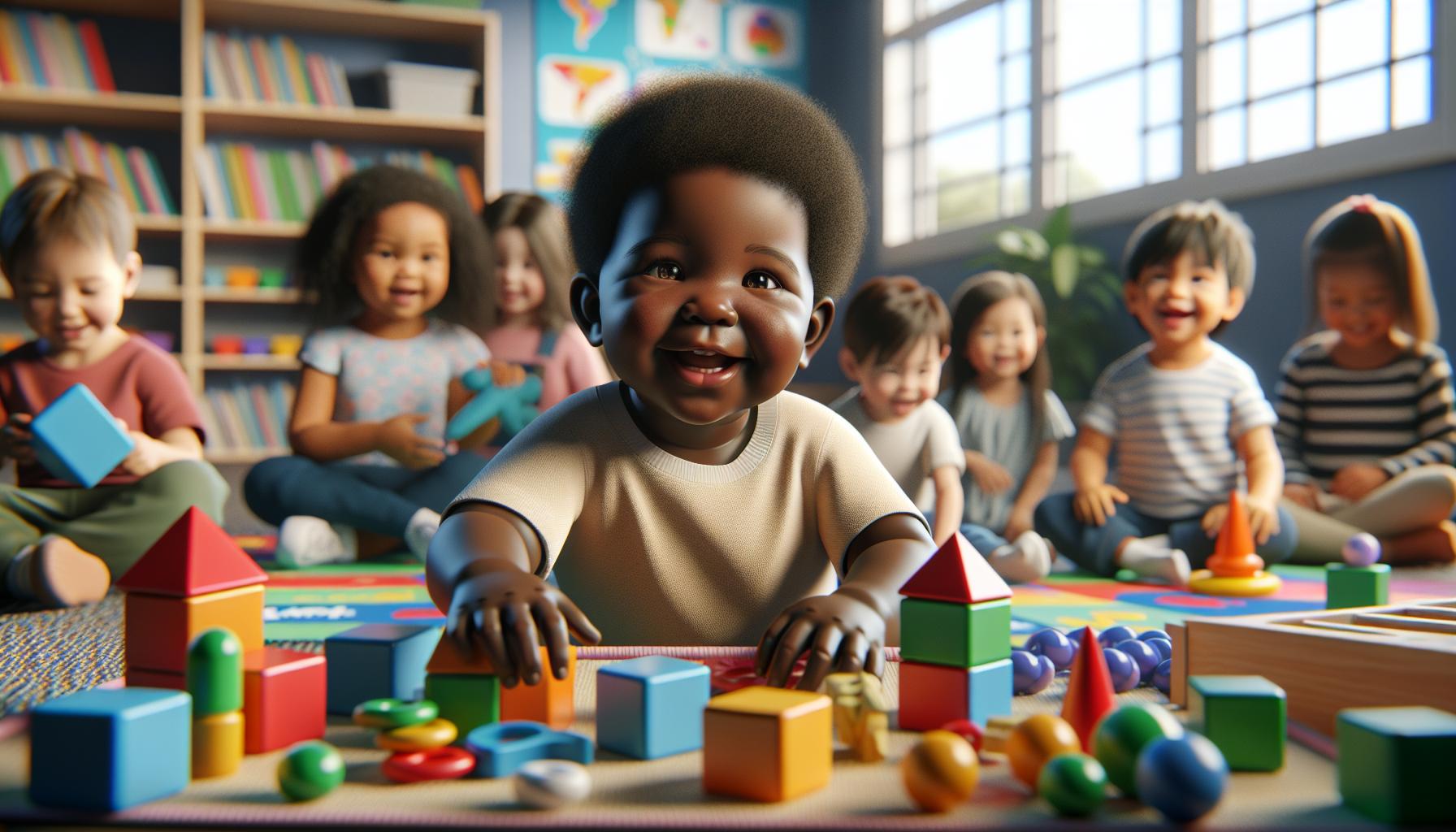Understanding child development is crucial for parents, educators, and caregivers alike. As children grow, they undergo significant changes that shape their physical, emotional, and cognitive abilities. Recognizing these milestones can empower adults to support healthy growth and foster a nurturing environment.
From the first steps to the first words, every stage of development brings unique challenges and joys. Knowing essential facts about child development helps in identifying potential delays and promoting positive interactions. This knowledge not only enhances a child’s learning experience but also strengthens the bond between adults and children. Dive into the fascinating world of child development and discover key insights that can make a lasting impact.
Key Takeaways
- Understanding Developmental Stages: Child development unfolds in distinct stages—infancy, early childhood, and school age—each characterized by crucial milestones that aid in recognizing typical growth patterns.
- Importance of Milestones: Recognizing key developmental milestones, such as walking and talking, helps caregivers identify delays and provide necessary support for healthy growth.
- Enhancing Emotional Intelligence: Comprehending children’s emotional development is vital for fostering empathy, self-regulation, and healthy emotional expression, which strengthens their interpersonal skills.
- Fostering Cognitive Growth: Engaging children in activities that promote reasoning, problem-solving, and imaginative play enhances their cognitive abilities, essential for academic success.
- Creating Supportive Environments: Factors like genetics, environment, and quality education heavily influence child development, emphasizing the need for nurturing and enriched settings.
- Early Intervention: Awareness of child development facts facilitates the early identification of potential developmental delays, allowing for timely interventions that can positively impact children’s futures.
Child Development Facts
Understanding child development facts plays a crucial role in fostering healthy growth in children. Knowledge of developmental milestones assists parents, educators, and caregivers in recognizing typical progression as well as potential delays.
- Identifying Milestones: Recognizing key developmental stages enables adults to acknowledge when children reach skills such as walking, talking, and social interaction. This awareness helps measure progress and adjust support accordingly.
- Promoting Positive Interactions: Knowledge of developmental phases helps adults interact appropriately with children. Engaging in age-appropriate activities strengthens bonds and promotes language skills and emotional regulation.
- Supporting Emotional Health: Comprehending emotional development aids adults in addressing children’s feelings and behaviors. Understanding emotional regulation encourages children to express themselves constructively.
- Enhancing Learning Environments: Familiarity with cognitive growth stages enhances educational strategies. Tailoring learning activities to children’s capabilities optimizes their absorption of new information and fosters problem-solving skills.
- Preventing Developmental Delays: Awareness of child development facts allows adults to identify early warning signs of delays. Recognizing these signs facilitates timely intervention, supporting children in reaching their full potential.
Incorporating knowledge of child development facts benefits not just the children, but also the adults who support their growth. Effective practices grounded in solid understanding yield positive outcomes for everyone involved.
Stages Of Child Development

Child development occurs in distinct stages, each marked by unique milestones and learning opportunities. Understanding these stages helps adults provide appropriate support.
Infancy
Infancy spans from birth to 12 months. During this stage, significant physical and sensory development occurs. Key milestones include:
- Motor Skills Development: Infants gain control over their bodies, progressing from reflexive movements to purposeful actions like reaching and grasping.
- Cognitive Development: Babies start to explore their environment, showing curiosity by grasping objects and tracking movements. They also develop memory skills, recognizing caregivers and familiar faces.
- Communication Skills: Infants communicate through crying and cooing, establishing the foundation for later language use. By 12 months, many infants say simple words like “mama” or “dada.”
Early Childhood
Early childhood typically occurs between ages 1 and 6. During this period, children experience rapid growth in various areas. Notable aspects include:
- Social Development: Children learn to interact with peers, developing skills for sharing, cooperation, and empathy through play and structured activities.
- Language Development: Vocabulary expands significantly, with children often using two- to three-word sentences by age 2. They enjoy storytelling and ask countless questions about their surroundings.
- Cognitive Skills: Children begin engaging in imaginative play, enhancing problem-solving abilities and creativity. They also develop an understanding of numbers, colors, and basic concepts through hands-on experiences.
- Academic Skills: Children refine reading, writing, and math skills, often mastering basic concepts and problem-solving techniques. School plays a critical role in this development.
- Peer Relationships: Friendships become increasingly important, influencing social skills such as negotiation and conflict resolution. Team activities foster a sense of belonging.
- Emotional Growth: Children develop a better understanding of their emotions and those of others, enhancing their ability to manage feelings and build resilience. They begin to understand the importance of responsibility and independence.
Key Child Development Facts

Understanding the key facts of child development is crucial for supporting children through their growth stages. Knowledge in this area aids adults in recognizing milestones and fostering positive environments for development.
Cognitive Development
Cognitive development involves a child’s ability to think, learn, and problem-solve. Key milestones include:
- 0-12 Months: Infants explore their surroundings through senses, learning cause and effect.
- 1-3 Years: Toddlers begin using language, recognizing objects and people, and showing curiosity through exploration.
- 3-5 Years: Preschoolers develop memory and attention skills, distinguish between reality and fantasy, and engage in imaginative play.
- 6-12 Years: School-aged children enhance logical thinking, develop reasoning skills, and grasp complex concepts.
By encouraging activities like puzzle-solving and storytelling, adults can foster cognitive skills effectively.
Emotional Development
Emotional development refers to a child’s ability to understand and manage their emotions. Key milestones include:
- 0-12 Months: Infants express basic emotions such as joy and anger and begin forming attachments.
- 1-3 Years: Toddlers start recognizing feelings in themselves and others, developing empathy and self-regulation.
- 3-5 Years: Preschoolers begin understanding complex emotions, learn to share, and express feelings verbally.
- 6-12 Years: School-aged children demonstrate more balanced emotional responses and learn to navigate friendships and social interactions.
Promoting emotional intelligence through open conversations and play helps children manage their feelings appropriately.
Physical Development
Physical development encompasses growth in motor skills and overall body health. Key milestones include:
- 0-12 Months: Infants gain control of their bodies by achieving milestones like rolling over, sitting up, and crawling.
- 1-3 Years: Toddlers enhance gross motor skills by walking, running, and climbing, while fine motor skills improve through activities like stacking blocks.
- 3-5 Years: Preschoolers refine coordination and balance, engage in physical activities like jumping, and begin to use tools like crayons.
- 6-12 Years: School-aged children develop strength and endurance, master complex motor skills, and participate in organized sports.
Encouraging active play and physical activities promotes healthy physical development during these crucial years.
Factors Influencing Child Development

Various factors shape child development, significantly impacting physical, emotional, and cognitive growth. Understanding these influences can guide adults in creating supportive environments for children.
Genetics
Genetics plays a crucial role in child development. Genetic factors determine physical traits such as height, eye color, and predisposition to certain health conditions. For instance, the presence of genes associated with cognitive abilities can influence intelligence and learning capabilities. Research shows that up to 50% of a child’s intelligence is hereditary, highlighting the importance of a genetic foundation in overall development.
Environment
The environment significantly influences child development. Socioeconomic status, access to resources, and family dynamics contribute to a child’s growth trajectory. Positive environments, characterized by stable housing, nutritious food, and protective relationships, foster healthy development. Conversely, adverse experiences such as neglect or exposure to violence can hinder development. Studies indicate that children raised in supportive environments achieve higher academic performance and better emotional health.
Education
Education serves as a vital factor in child development. Early exposure to structured learning environments enhances cognitive growth and social skills. Quality educational programs build foundational skills such as literacy and numeracy while promoting critical thinking. Research demonstrates that children enrolled in pre-kindergarten programs show improvement in language skills and socialization. Additionally, continuous engagement with educational activities fosters a lifelong love for learning, positively impacting future opportunities.
Understanding Child Development
Understanding child development is essential for nurturing healthy growth and fostering positive relationships. By recognizing key milestones and the unique challenges of each stage, adults can provide the support children need to thrive. This knowledge not only helps in identifying potential delays but also enhances interactions through age-appropriate activities.
Promoting a supportive environment tailored to a child’s developmental needs can make a significant difference in their overall well-being. As adults become more informed about the factors influencing development, they empower children to reach their full potential. Investing in this knowledge ultimately benefits everyone involved, paving the way for a brighter future.